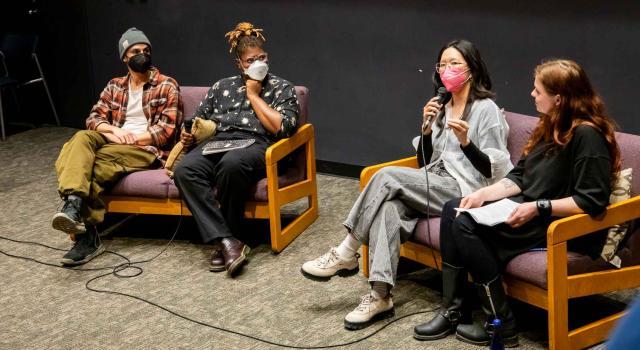24th Annual Eqbal Ahmad Lecture Featured Montana Rep. Zooey Zephyr on Trans Rights, Democracy, and Persistent Hope
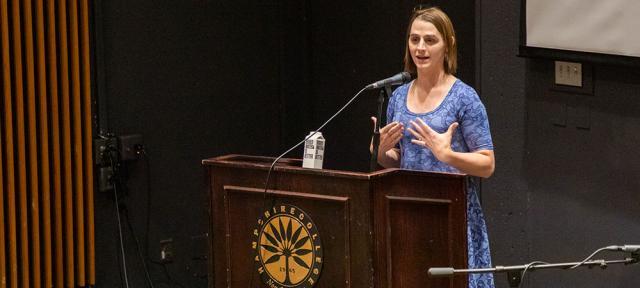
On October 19, the 24th annual Eqbal Ahmad Lecture, “[Trans]Gender Politics in the U.S. Streets and State Houses,” took place at Hampshire College. In the spirit of the series honoring the late Hampshire professor, Montana Representative Zooey Zephyr addressed a timely topic with wide-ranging cultural implications: intersectional, anti-racist, transgender-affirming activism that extends from the streets to the state houses.
Zephyr, who is the first transgender woman elected as a legislator in the history of Montana, presented her talk in Franklin Patterson Hall’s Main Lecture Hall, which was packed with students, faculty, staff, and members of the Five College community. Ahmad’s wife and daughter were in attendance on Zoom, along with other guests from around the globe. The event was free and open to the public.
This April, while the Montana House was debating a bill that would prohibit gender-affirming health care for children, Zephyr garnered instant national attention not just for speaking against the measure, but also for being silenced for her comments. “I hope the next time there’s an invocation, when you bow your heads in prayer, you see the blood on your hands,” she told her colleagues.
Eight days later, after a protest at the Capitol, House Republicans voted to censure Zephyr, thus disallowing her participation in debates on the House floor for the rest of the session. In doing so, they inadvertently made her famous.
To a news camera the day she was kicked out, she addressed any transgender youths watching: “Please stay alive. We will get through this.”
Zephyr emphasized that despite everything, she feels pride and determination. “I felt, quite frankly, more hope than I had felt in a long time following the legislature, and that can be a weird thing to say in a moment after getting booted out in a year where over 500 bills targeting our community have come before the state houses across the country. . . . So, I want to talk about how can you come out of an experience like that on fire, with hope?”
She told the crowd she hadn’t planned to be a politician, but she saw community suffering and was too compelled not to get involved. “The interesting thing about activism is that you’re patching the wounds left over after policy decisions,” Zephyr said. “In 2020, the wounds were coming too fast. We had COVID, we had the George Floyd protests, we had the rise of anti-abortion policy, we had the rise of anti-LGBTQ policy. . . . When it was too much, I said, ‘What the hell is my government doing? I’m going to go bang on the door.’”
Her background was interdisciplinary in a way that resonated with the Hampshire community. She studied creative writing — “helpful for selling a narrative,” she said — and Middle English literature, the reading of which, she joked, made reading laws downright entertaining, and was a professional video game player for two years, an experience that taught her to lose again and again, then get up and keep going.
Zephyr discussed the policies being pushed in state houses across the country attempting to erase not just trans people themselves, but also their pasts, presents, and futures. Highlighting the banning of memoirs about LGBTQ+ people, the exclusion of trans people from bathrooms, and the insistence on gender binaries and lack of health care, she vividly reinforced the need to oppose those ideas.
She talked about the cruelty that some policymakers flaunt with intention to hurt communities, and what they’re willing to give up to prevail. She described the danger to our democracy if we don’t allow those we elect to speak for us to actually talk.
But between each story of adversity and challenge, she highlighted one of someone surprising who had shown support — for example, the American Indian Caucus of Montana. Their representative said, “Trans people may be the target of this legislature today, but we’re not fooled. We’ve seen renditions of these attacks again and again, and my community sees them for what they are: the road to fascism.”
She also described the Wrangler-wearing, pick-up driving middle-aged man who stopped her in Glacier National Park to tell her that though he is a Republican, he “is not like them” and “I wanted you to know that you’re my hero.” Then there was the security officer who sidled up to her after midnight at a hotel and whispered, “The National Guard’s got your back.”
“Hope is a fuel you burn through; hope is not a laurel you sit on,” Zephyr said near the end of her lecture. “It’s a resource, and you need it to keep going.”
After her speech, Director of the Office of Accessibility Resources and self-described “gender alchemist” Teal van Dyke hosted a Q & A with the audience.
During it, Zephyr talked about having made friends with a right-wing politician in her own House starting by complimenting the little hats that matched her carefully composed outfits. After they got to know each other, the legislator dropped the anti-trans bills she had planned to present. “That is moving the needle,” Zephyr said. “That’s what representation gets you: having the courage to talk to someone who, by and large, does not recognize your full humanity in their votes.”
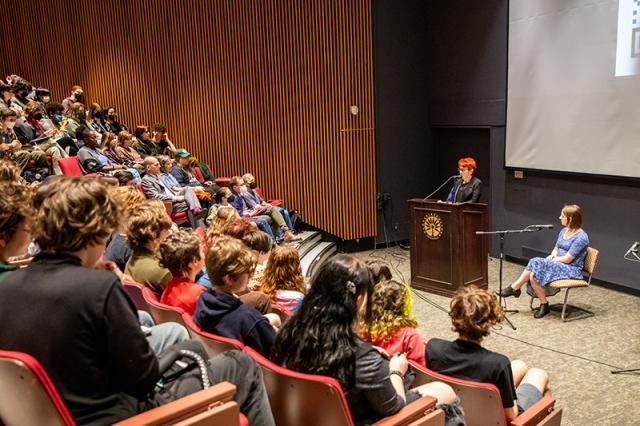
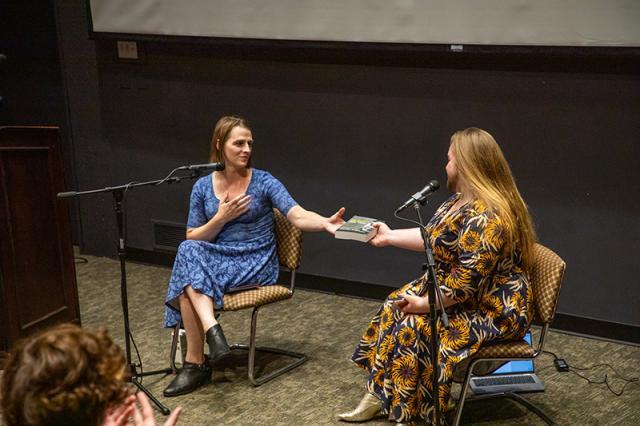
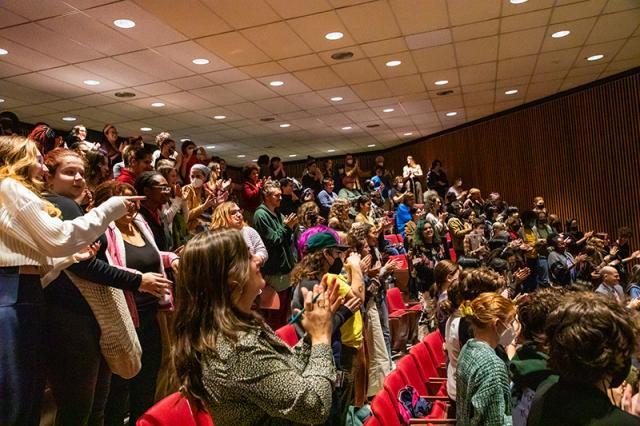
The Eqbal Ahmad Lecture Series is an annual event in honor of the scholarship, teaching, and activism of former Hampshire faculty member Eqbal Ahmad.



